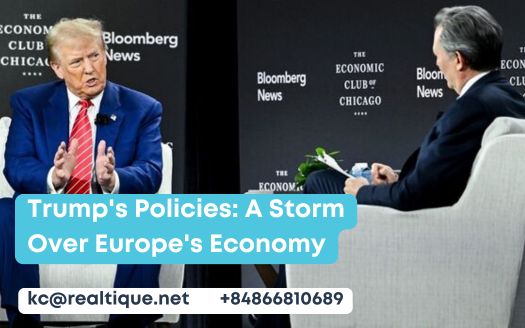Trump’s Policies: A Storm Over Europe’s Economy
The implications of Trump’s policies on Europe’s economy warrant a careful examination, particularly as proposed tariffs threaten to disrupt the longstanding U.S.-EU trade relationship valued at $1.3 billion. With growth forecasts for the Eurozone and key economies like Germany being downgraded, the potential fallout from these trade tensions raises critical questions about the stability of European markets. Moreover, the effects of the Inflation Reduction Act could impose additional burdens on European firms, complicating their competitive environment. The unfolding scenario invites scrutiny into the broader economic ramifications and long-term relationships at stake.
Table of Contents
The recent economic growth projections for the Eurozone indicate a downward trend, reflecting increasing uncertainty tied to U.S. trade policies under the Trump administration.
Goldman Sachs has revised its growth forecast for the Eurozone in 2025 from 1.1% to 0.8%, while projections for 2026 have been adjusted from 1.1% to 1%.
Germany’s economic growth is particularly concerning, with expectations dropping from 0.9% to just 0.5%.
Berenberg Bank anticipates a general decline in Eurozone growth to 1%, highlighting the pervasive impact of trade uncertainties.
Such adjustments suggest that the Eurozone’s recovery may be stifled, driven by factors including potential tariffs and trade tensions, as businesses grapple with an unpredictable economic environment influenced by U.S. policies.
Trade Policy Impacts
Increasing concerns over economic growth in the Eurozone are closely linked to the potential impacts of Trump’s trade policies. Proposed tariffs on imports, ranging from 10% to 20%, threaten to disrupt the strong U.S.-EU trade relationship, valued at $1.3 billion annually. EU exports, particularly in sectors such as steel, automobiles, and machinery, face significant risks. The following table summarizes key export categories from the EU to the U.S.:
| Export Category | Percentage of Total Exports |
|---|---|
| Machinery | 34% |
| Chemicals | 18% |
| Vehicles | 16% |
| Steel | 12% |
| Other | 20% |
As trade tensions escalate, European nations may experience considerable economic setbacks, further exacerbating growth challenges.
Inflation Reduction Act Effects
Amid ongoing concerns about trade relationships, the Inflation Reduction Act (IRA) introduces significant implications for Europe’s economy.
As a crucial piece of environmental legislation, the IRA raises apprehensions regarding compliance with global trade regulations among European nations. The act potentially places European firms at a competitive disadvantage, particularly in the clean energy sector, due to its favorable provisions for U.S. companies.
Consequently, European businesses may encounter stricter market access conditions, which could exacerbate existing trade tensions.
In addition, the IRA’s implementation is likely to precipitate increased trade disputes, as European nations perceive violations of international trade agreements.
These factors collectively threaten to undermine the stability and growth of Europe’s economic environment in the near future.
Financial Sector Reactions
Concerns regarding Trump’s trade policies have led to heightened apprehension within the financial sector, as experts warn of potential inflationary pressures and economic strain in Europe.
European Central Bank (ECB) officials have expressed fears that U.S. policy shifts could catalyze economic turmoil, prompting volatility in financial markets. Analysts predict that the proposed increase in tariffs could trigger a recession in the eurozone, compounding existing economic challenges.
Berenberg Bank highlights that the anticipated tariffs may further exacerbate inflation, lowering growth projections and undermining consumer confidence.
The financial sector’s response reflects a growing unease about the sustainability of economic recovery in Europe amidst uncertain trade relations, emphasizing the need for contingency planning and strategic adjustments to mitigate potential fallout.
Long-term Economic Relationships
As Europe’s economy maneuvers the complexities of global trade, the integration into international supply chains has become increasingly essential, particularly with key partners like China. This relationship is crucial not only for economic stability but also for long-term growth prospects.
Key elements shaping these long-term economic relationships include:
- China as Europe’s second-largest trading partner, following the U.S.
- Significant imports from China, including electronics, machinery, and automotive components.
- The potential for trade interactions to shift dramatically if U.S.-China relations deteriorate under Trump’s administration.
- An urgent need for the EU to diversify trade partnerships to mitigate risks stemming from unpredictable U.S. economic policies.
The future of Europe’s economy hinges on adapting to these changing global trade relationships.





